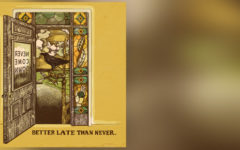
Widely — and wisely — considered one of the current mainstays of the so-called newgrass movement, Town Mountain take a decided step back in time with their new release on New West Records, Lines in the Levee. That’s not to say they’re regressing — not by any means — but they are doubling down on some bygone influences. Echoes of Levon Helm at the helm of the Band abound, so much in fact that on songs such as Lines in the Levee, Comeback Kid, Seasons Don’t Change, and Distant Line, one could swear they’re listening to outtakes from such classic Band fare as Stage Fright or Cahoots. Again, that’s not a knock, much less a critique, but simply a statement of the obvious, and in fact, a comparison that serves them quite well.
Nevertheless, the album doesn’t hang its intents solely on the similarity alone. The rowdy Firebrand Road simply sounds like upbeat exercise in rabble rousing, good ‘ol boy indulgence, just as American Family takes on an upbeat enthusiasm notably absent from many of the other entries. Several tracks — Rene, Daydream Quarantine and Lean Into the Blue in particular — convey a rustic, rootsy delivery, a sound that takes its cue from the down home delivery of their North Carolina origins. “Workin’ on big decisions,” they insist on the song titled, appropriately, Big Decisions. “Cuttin’ out on this so-called livin’/You can say my choices ain’t worth a damn/That’s a damn I’m just through givin’…”
In that regard, it’s that blue collar ethic that colors many of these same selections. The understated eloquence of Unsung Heroes and Seasons Don’t Change convey their subdued sentiments with an honesty and humility that reflects an otherwise unassuming attitude. The band — Phil Barker on vocals, mandolin, and acoustic guitar, fiddler Bobby Britt, vocalist and acoustic guitarist Robert Greer, singer, guitarist and banjo player Jesse Langlais, bassist Zach Smith, and drummer Miles Miller — are a cohesive unit, given that the musicians blend their instruments in sync to fill out the arrangements, rather than always insisting on taking center stage. That’s one reason why Lines in the Levee sounds both seamless and evocative all at the same time.
Happily then, there are no fault lines evident as far as that particular proposition is concerned.







